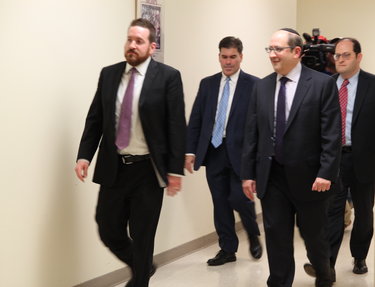As Legionnaires and pandemic hit back-to-back, Guilderland IDA grants Promenade short-term tax relief
The Enterprise — Michael Koff
Unable to take in new residents — and the revenue that comes with them — in part because of a legionella outbreak and then the coronavirus pandemic, the owners of Promenade at University Place on Western Avenue in Guilderland reworked their tax deal with the towns’ Industrial Development Agency to gain some relief.
GUILDERLAND — With an occupancy rate of about 20 percent and the meager revenue that goes with it, Promenade at University Place on Western Avenue sought and was granted an amendment to its tax agreement with the Guilderland Industrial Development Agency that, if it were in place this year, could have save the assisted-living facility “a little under $50,000,” according to Donald Csaposs, the IDA’s chief executive officer.
The amendment to the PILOT, or Payment in Lieu Of Taxes, agreement would be for the owners of Promenade “to pay 100 percent of the normal tax that they would otherwise be obligated to pay,” said board attorney A. Joseph Scott during the Aug. 24 IDA board meeting.
Csaposs told The Enterprise on Aug. 28 that, when the current owners of Promenade were in the process of acquiring the former Best Western hotel and converting it into an assisted-living facility, they approached the IDA for financial assistance.
The board was concerned with the potential impact on property-tax revenue for the town, county, school district, and library, Csaposs said, and in particular, the board got some feedback from the school district “evidencing concern” that the tax revenue it derived from the property would go down.
After much discussion, Csaposs said, the board came up with what it thought was a reasonable compromise: The IDA would give Promenade the PILOT, but it would get a floor, an amount that the annual payment could not go below.
“At no time during the course of the PILOT agreement — a 10-year period — at no time will the tax paid by the facility be any less than what it generated during its last year of occupancy as a motel, adjusted annually by the change in the Consumer Price Index,” Csaposs said. The agreement was a little complicated, Csaposs said, but it would protect the taxing jurisdictions from a decline in revenue during the term of the PILOT.
At the Aug. 24 meeting, Promenade asked to do away with the floor, which the IDA board agreed to do for a period not to exceed three years. But the facility is required to notify the IDA on a quarterly basis of its occupancy rate and, once that rate hits 85 percent, the elimination of the floor payment is rescinded — the IDA relief goes away and Promenade goes back to making its regular PILOT payments.
Assuming the owners accept the new agreement, it wouldn’t go into effect until January 2021.
Promenade PILOT
The Promenade PILOT has been the only one approved by the Guilderland IDA in its 40-plus year history, Csaposs said. He said that the IDA has a uniform tax-exemption policy for PILOT agreements: a 50-percent exemption for five years after which taxes are phased back in gradually, adding 10 percent per year, so that by the 10th year the owner is paying 100 percent.
Because property-tax relief is being provided every year for 10 years, Csaposs said, PILOTs have a cumulative effect, which is why the Guilderland IDA is conservative when it comes to approving them.
Speaking to Promenade’s PILOT, Csaposs said that the IDA board opted to provide its owners with tax assistance in large measure because the assisted-living facility puts aside 20 percent of its beds for Medicaid recipients, adding that it’s the only assisted-living facility in Albany County that accepts Medicaid clients. He also said the IDA took into consideration that the owners were going to rehabilitate a troubled building with a history of legionella.
The Promenade PILOT took effect in January 2019, Csaposs said.
Shortly after the PILOT took effect, he said, legionella reappeared at the facility. (A number of cases of Legionnaires’ disease were linked to the building in 2010 and 2012, when it had been a Best Western Sovereign Hotel.)
The owners were prohibited by the state Health Department from accepting new residents, Csaposs said, “They only had a miniscule number of residents in there, and then they were … prevented from taking any more [new residents].”
About a year later, Promenade was recertified by the health department for new-patient admissions, he said; that was about February 2020.
“And we all know what happened in February 2020,” he said, referring to the early days of the coronavirus pandemic.
Meanwhile, the owners continue to make their PILOT floor payment, Csaposs said. For all of 2019, Promenade paid the PILOT at the floor-level.
Over the summer, Promenade’s owners went to the IDA and said they were having a hard time, Csaposs explained; at the time, the facility’s occupancy rate was less than 20 percent.
The company claimed it wasn’t generating enough revenue “to properly honor” its “obligations,” although it continued to do so, he said. Promenade continued to pay its tax bill, at least to the IDA, although Csaposs also pointed out that he hasn’t seen the company being delinquent on any of its other tax obligations.
The request from the owners was for the elimination of the floor payment.
The IDA understood the request and understood that further modifications would be needed to the buildings’ water infrastructure — the company claimed another $850,000 in modifications were needed; it claimed to have already invested close to $1 million in its water infrastructure.
Since Promenade continued to invest in its facility, it had been current in its tax payments to the IDA, and “they’ve been very frank in reporting to us their difficulties,” Csaposs said, the board discussed what it could do to help.
The board could eliminate the floor payment outright, as requested by the owners, he said, or the board could modify the PILOT agreement to waive the floor requirement during this period of financial distress, which is what the board elected to do.
Nominal and assessed value
Promenade is not currently on the town assessment roll because it’s covered by a PILOT agreement, Csaposs said; however, all properties in Guilderland have an assessed value assigned to them.
If there is a PILOT agreement in place, he said, the assessed value is called a notional or nominal value.
Promenade’s property has a notional value of $2.1 million, he said.
In 2020, Promenade paid the town and county approximately $19,000 in taxes, and paid the school district about $60,000, Csaposs said.
“The notional value times the tax rate divided by 50 percent — in other words, a PILOT payment with the floor removed — would be on the order of [$34,000 or $35,000],”
During the Aug. 24 IDA meeting it was said that Promenade asked for the PILOT amendment to take place immediately, but the IDA decided that the monetary hit would be too large for the school district to take this late in the year, particularly given what’s going on with state aid, Csaposs said on Aug. 28.
Twenty percent of state aid to schools is being withheld since the federal government has not come up with stimulus money for state governments.
So the IDA board decided that the amendment would go into effect in January 2021 — this September’s school bill will be paid based on the higher PILOT calculation.


